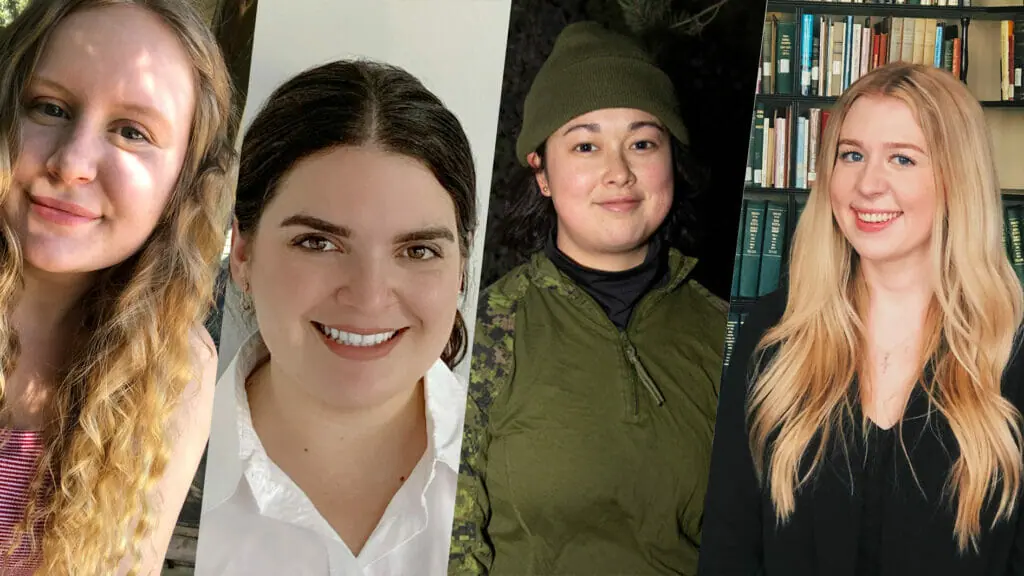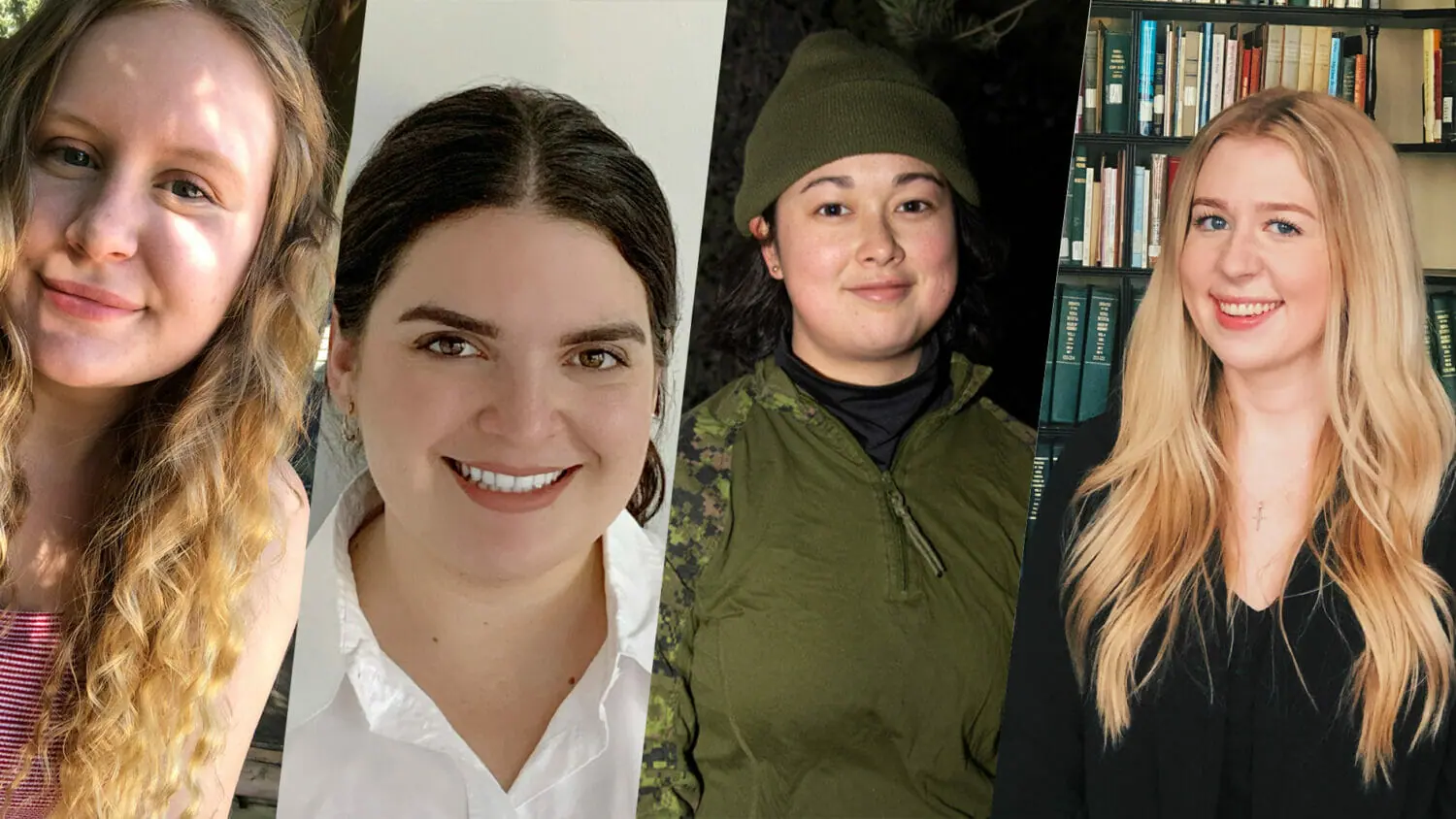A group of Dalhousie University students got a chance to experience the future of Canadian politics at a virtual conference with federal party leaders earlier this month.
Six Dal students were selected to attend the Daughters of the Vote conference from March 5 to 8, 2021. The conference held once every two years is hosted by Equal Voice Canada, a multipartisan organization that strives to increase the involvement of women in Canadian politics at the municipal, provincial and federal levels.
The conference selects 338 delegates from across the country to represent all federal ridings. Usually hosted in Ottawa, the weekend culminates in a mock House of Commons session attended by national media, federal party leaders and the prime minister. Each delegate who’s admitted to the conference is put in touch with their riding’s actual member of parliament (MP).
Delegates chose three ridings they would be interested in representing on their application for the program. With the conference being virtual this year, there was also space for more than 338 delegates, resulting in there being some delegates-at-large who did not represent a riding.

In attendance from Dal were students Caleigh Wong, Tatiana Portelli-Graham, Jenna Andrews, Charlotte Moase, Emily Stapleton, Katherine Meagher and teaching assistant Stacie Smith.
The weekend aims to teach young women how they can make a difference in their communities through politics, an attempt to further Equal Voice’s ultimate goal of gender parity in politics.
Daughters of the Vote 2021 built on this vision.
“I never really considered running for a House of Commons seat before,” said Meagher, who studies international food business. “But it’s definitely something that’s kind of now in the back of my mind for later in the future.”
An opportunity with Trudeau
While most students apply to the conference because of their interest in politics and improving their community, Wong, an international development studies and civil engineering student, applied to the conference for a more specific reason.
“My main reason, honestly, for wanting to do it was the fact that I knew that if you got accepted into this program, you would have a chance to make a statement in an audience with the prime minister, with all the federal party leaders and the national media as well, on something that you really feel needs to be brought up to that level of a platform,” Wong said.
She was selected as one of 30 delegates to give a 60-second speech at the House of Commons session, which she used to shed light on systemic oppression within the Canadian Forces — an issue with renewed public interest as two of Canada’s former chief of the defence staff are being investigated for sexual misconduct.
Wong is a queer woman of colour who serves as a reservist in the Canadian military. In 2020, she took time off from Dal to serve on a NATO mission in Latvia where she said she fully came to understand the racism, homophobia and misogyny embedded within the top ranks of Canada’s military, and the culture of its soldiers.
“What I know is that every woman and racialized member I’ve met in this career has experienced discrimination serving this country,” she said in her speech at the House of Commons session, the full video of which is on YouTube.
Usually, delegates get to make their speech in person with the prime minister present. But this year, due to COVID-19, the speeches were pre-recorded and broadcast during the virtual session.
The opportunity to be in the same room as federal party leaders was seized by the last group of Daughters of the Vote delegates. In 2019, several members turned their backs to Trudeau as he spoke, protesting his handling of the SNC-Lavalin scandal of that year.
Delegates are also normally granted a question and answer period with the prime minister. In 2019, delegates similarly questioned Trudeau about his decision to eject former attorney general Jody Wilson-Raybould and former Treasury Board president Jane Philpott from the Liberal caucus.
But this year, Trudeau chose to opt-out of a question period.
“There was definitely some disappointment,” Wong said. Trudeau’s decision provided no opportunity for real discussion around the delegates’ statements toward him, Wong said.
Building a community of future leaders
“Learning to network with people from every region and demographic in Canada I think was what I was most looking forward to,” said Moase, a political science student.
This came to fruition over the course of the weekend, Moase said. She said she learned the most from her Indigenous colleagues about their experiences in political settings and how they’d like to continue to be involved in Canadian politics.
Portelli-Graham, who’s from Toronto, wanted to take the opportunity to learn about challenges affecting Canadians in other parts of the country.
“I come from a large city. So, the issues I face are very different than someone who lives in rural Saskatchewan within a farming community,” said Portelli-Graham, who studies social work at Dal.
Meagher, who’s from rural Saskatchewan, provided delegates with this perspective. In discussions with delegates, she raised the issue of the pandemic’s impact on the agricultural industry, which has been affecting her home riding of Cypress Hills-Grasslands, Sask. (the same riding she represented at the conference).
“There are a lot of beef producers around where I live. They were experiencing large demand drops because of the food service industry essentially shutting down,” Meagher said.
“So I just saw how that was impacting them, how they had to euthanize a lot of their animals and how hard that was for them,” she said.
Because of Daughters of the Vote, Meagher was able to discuss these issues with her MP Jeremy Patzer.
Even those who are still waiting to hear back from their MP have had the opportunity to meet with other members of parliament through the conference. Stapleton, who represented the riding of Dartmouth-Cole Harbour, N.S. was most recently chatting with Fredericton MP Jenica Atwin.
“A bunch of the Atlantic delegates, we have a Facebook group, and we got together and we had a little Zoom chat with [Atwin] last night, which is pretty neat,” said Stapleton, a student at Dal’s Schulich School of Law.
Being part of the community of more than 300 young women eager to make change boosted morale in a time where it’s been hard to find, Portelli-Graham said.
“When I kind of see what’s going on in the political realm, I get a little bit discouraged,” said Portelli-Graham. “[Daughters of the Vote] inspires me to go make a difference. It inspires me to not be held back by my fears, or the discouragement that I feel.”


Recent Comments